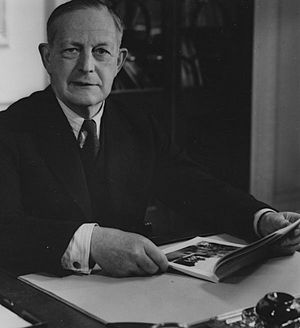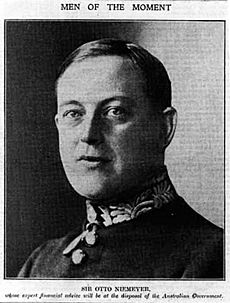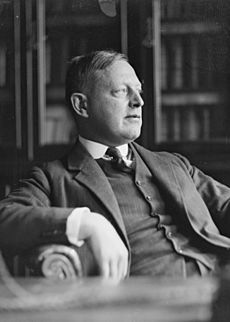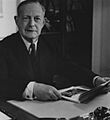Otto Niemeyer facts for kids
Quick facts for kids
Sir Otto Niemeyer
|
|
|---|---|
 |
|
| Born | 5 February 1873 Streatham, London, England
|
| Died | 3 November 1955 (aged 82) Lindfield, Sussex, England
|
| Education | Balliol College, Oxford |
| Occupation | Banker |
| Known for | Director of the Bank of England (1938–1952) |
| Spouse(s) |
Sophie Niemeyer
(m. 1910) |
Sir Otto Ernst Niemeyer (23 November 1883 – 6 February 1971) was an important British banker and government official. He worked as a director at the Bank of England from 1938 to 1952. He was also a director of the Bank for International Settlements for many years.
After studying at Oxford University, Niemeyer started working for the British government's finance department, HM Treasury, in 1906. He quickly moved up the ranks. He became the controller of finance from 1922 to 1927. Later, he joined the Bank of England. He traveled to many countries to give financial advice. His visit to Australia in 1930 caused a big political stir there.
Contents
About Otto Niemeyer's Life
Otto Niemeyer was born in Streatham, London. He was the oldest of three children. His mother was English, and his father was from Germany. His father moved to Britain in 1870 and became a British citizen.
Otto went to St Paul's School, London and then to Balliol College, Oxford. In 1910, he married Sophie Niemeyer, who was a distant cousin. They had four children together. He later retired to Lindfield, Sussex, where he passed away in 1971 at age 87.
Otto Niemeyer's Career in Finance
Working at the Treasury
Niemeyer started his career at HM Treasury in 1906. This is the part of the British government that manages the country's money. He quickly became a senior official. By 1922, he was the controller of finance. This meant he was the main advisor to the Chancellor of the Exchequer (Britain's finance minister) on money matters.
He also represented Britain on the financial committee of the League of Nations. This was an international group that tried to solve global problems. Many people thought he was a very important official. He helped bring back the British Gold Standard Act 1925. This law linked the value of British money to gold. He left the Treasury in 1927, feeling he had reached the top there.
Working at the Bank of England
In 1927, Montagu Norman, the head of the Bank of England, asked Niemeyer to join the bank as an advisor. Niemeyer continued to work with the League of Nations. He also worked with the Corporation of Foreign Bondholders. This group helped manage debts that foreign countries owed.
In 1938, Niemeyer became an executive director of the Bank of England. He was even considered to become the head of the bank in 1944. However, Winston Churchill, who was Prime Minister at the time, did not agree. Niemeyer often acted like a diplomat for the bank. He traveled to many countries to give financial advice. He also checked on countries that owed money to the bank. He visited Australia, New Zealand, Brazil, Argentina, India, and China.
Advice to Australia in 1930
In the late 1920s, Australia had a lot of debt. Much of this debt was from British banks. This was partly due to Australia's economic plans and large debts from World War I. After the Wall Street Crash in 1929, the world faced a big economic downturn. This led to the Great Depression in Australia.
Australia asked Britain if it could delay paying back its war debts. To help decide, the Bank of England sent Niemeyer to Australia. He was there to check on Australia's financial health. Australia's Prime Minister, James Scullin, agreed to the visit. He hoped Niemeyer's advice would support his government's financial plans.
Niemeyer arrived in Australia in July 1930. He told Australian leaders that the country was spending too much. He said Australia was "living beyond its means." He warned that Australia needed to fix its finances quickly. He believed Australians were too hopeful about their country's future. He suggested that Australians would need to accept a "lower standard of living."
Niemeyer's advice was not popular with everyone. Some Australians felt he was telling them how to run their country. They thought he was only looking out for the interests of rich overseas bankers. This was a difficult time for Australia, and many people were struggling. The Australian governments later agreed on a plan called the Premiers' Plan to deal with the economic crisis.
Other Important Activities and Awards
Besides his work at the Bank of England, Niemeyer was a director of the Bank of International Settlements. This is an international bank for central banks. He was chairman of this bank from 1937 to 1940. He also helped start the National Association for Mental Health. He was chairman of the London School of Economics from 1941 to 1957.
Niemeyer received several important awards for his service. He was made a Companion of the Order of the Bath (CB) in 1921. He became a Knight Commander of the Order of the Bath (KCB) in 1924. Finally, he was made a Knight Grand Cross of the Order of the British Empire (GBE) in 1927. These honors showed his important contributions to public service.
Images for kids
 | Leon Lynch |
 | Milton P. Webster |
 | Ferdinand Smith |






